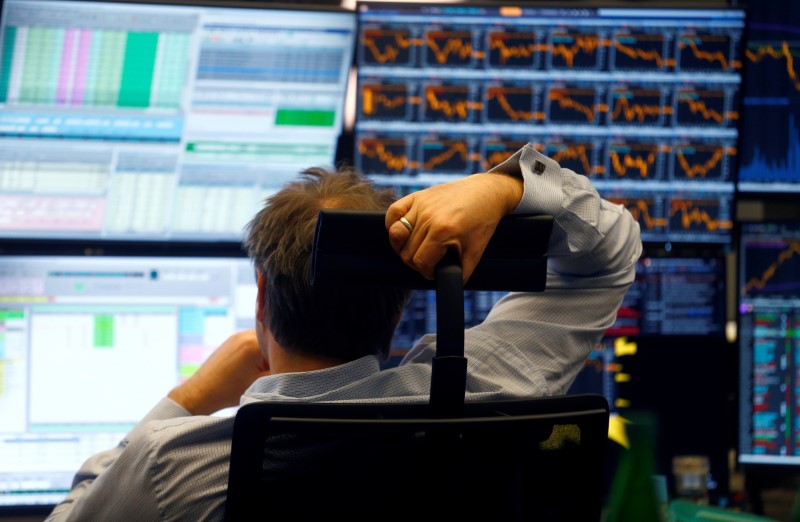By Tommy Wilkes
LONDON (Reuters) - European shares struggled on Monday as fears of the escalating U.S.-China trade conflict outweighed the boost to sentiment from Chinese authorities' intervention last week to shore up its currency.
Disappointing corporate earnings in the European banking sector added to the cautious start to the week's trading.
Chinese state media launched an unusually personal attack against U.S. President Donald Trump's trade policies on Monday, saying Trump's trade "extortion" would not work.
It also sought to reassure investors about Chinese economic strength as the months-long dispute rattles financial markets and raises deepening worries about the impact on the real economy.
After an initial rise, Asian shares earlier succumbed to selling pressure, with Chinese shares sliding into negative territory.
European shares were also mixed. The pan-European share index (STOXX) dropped 0.06 percent while Germany's DAX (GDAXI) fell 0.34 percent and France's CAC 40 (FCHI) was virtually flat, down 0.02 percent.
The biggest plunge in German industrial orders in nearly 18-months added to pressure on German stocks.
The weakness in European shares followed a more than 1 percent drop in the Chinese blue-chip index (CSI300) and Shanghai's SSE (LON:SSE) Composite (SSEC). Japan's Nikkei (N225) and South Korea's Kospi index (KS11) also dropped.
The MSCI world equity index (MIWD00000PUS), which tracks shares in 47 countries edged down 0.08 percent.
"In his latest Twitter tirades and his latest appearances in front of his supporters the U.S. president has indicated something akin to a "strategy" behind his trade war policy," Commerzbank (DE:CBKG) said. "The trade war will remain in place regardless of how much the Chinese cave in."
The trade dispute remains a live issue for markets with China proposing tariffs on $60 billion worth of U.S. goods on Friday, while a senior Chinese diplomat cast doubt on prospects of talks with Washington to resolve the bitter trade conflict.
At the same time, Trump said his strategy of placing steep tariffs on Chinese imports is "working far better than anyone ever anticipated", citing losses in China's stock market. He predicted the U.S. market could "go up dramatically" once trade deals were renegotiated.
The People's Bank of China's intervention last week to impose a reserve requirement on foreign exchange forward contracts had the desired impact of halting the slide in the yuan.
In offshore markets, the Chinese currency fell 0.1 percent against the dollar to 6.8562
The yuan has been one of the main casualties from the trade conflict, with many investors speculating that the PBOC was happy for the renminbi to weaken to counter the impact of U.S. tariffs.
Traders saw the PBOC effort as an attempt by Chinese authorities to show they wanted stability, and some interpreted it as a conciliatory move to nudge the Americans towards the negotiating table.
Other said the intervention would not stop further yuan weakness with Washington and Beijing at loggerheads over tariffs.
The dollar index, which has benefited as investors rush to safety, rose 0.2 percent to 95.291 (DXY), close to a 2-1/2 week high.
U.S. jobs data on Friday, although weaker than expected, underlined that the world's largest economy is growing robustly, supporting synchronized global growth that had underpinned sentiment towards risk assets before the eruption of the trade dispute.
Markets are increasingly nervous about whether U.S. growth may have peaked.
"Investors are also closely watching the rising value of the U.S. dollar, slowing global economic growth and the risk of the Federal Reserve tightening short-term interest rates too quickly and dampening domestic economic growth," said Lachlan McPherson, Senior Investment Consultant at Charles Schwab (NYSE:SCHW) Australia.
The euro (EUR=) inched down to $1.155.
The British pound
Gold

Brent crude futures (LCOc1) rose 0.5 percent to $73.55, while U.S. crude oil futures (CLc1) added 0.7 percent to $68.94 a barrel.